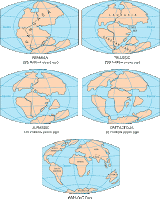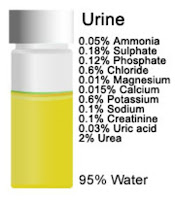Monday, May 10, 2010
Getting Ready to go to Sea
I leave for Dutch Harbor, Alaska in one week for my adventure on board the Oscar Dyson. I need to start getting ready. First I have to find out what the weather is like around Dutch Harbor. To help me, find the answers to the following questions and post in the comment section.
1. What is the latitude and longitude of Dutch Harbor, Alaska?
2. What is the average high and low temperature in May and June?
3. What is the average rainfall?
4. when will the sun rise on May 20th and when will it set?
Tuesday, May 26, 2009
Evidence for Continental Drift

As you know, Alfred Wegener came up with the theory of continental drift based on evidence he had gathered from different scientific fields. His idea was that all of the continents were once one large landmass and have since moved apart. His evidence came from land features, fossils and climate changes. Since Wegener's time scientists have found a lot more evidence that the continents have moved. Research continental drift and find at least 2 specific examples of evidence that the continents have moved.
Tuesday, May 19, 2009
Journey to the Center of the Earth

After flying around in the atmosphere, now we are descending into the solid part of the earth. In class, we brainstormed questions about the structure of the earth. Pick one of these questions to research and post your findings:
1. How old is the Earth and how do scientists figure this out?
2. How did the Earth form?
3. How did the oceans form?
4. Why are the oceans salty?
5. Who has been to the deepest part of the ocean and how did they get there?
6. How do scientists think magnetic polar shifts happen?
Tuesday, May 12, 2009
The Atmosphere

The atmosphere has 4 main layers; the troposphere, the stratosphere, the mesosphere and the thermosphere. These layers are characterized by changes in temperature, but each has different phenomena that occur there. Research one of the layers of the atmosphere and write an interesting fact that you learned about it in your blog comment for this week.
Tuesday, May 05, 2009
Frogs!!!
Monday, April 27, 2009
Animal skins
Our skin has many functions. It serves as a barrier, protecting the skin from injury, infection and water loss. It also helps to regulate body temperature and eliminate wastes. It produces vitamin D. Finally it helps us gather information about our environment through our sense of touch. Our nails and hair are both part of our skin.
Monday, April 13, 2009
Excretory System
 You've just learned how the kidneys filter blood in the microscopic units called nephron. Wastes such as urea form urine which travels from the kidneys to the urinary bladder by way of the ureters. From the bladder, urine travels through the urethra out of the body. Do other animals produce urine in the same way?
You've just learned how the kidneys filter blood in the microscopic units called nephron. Wastes such as urea form urine which travels from the kidneys to the urinary bladder by way of the ureters. From the bladder, urine travels through the urethra out of the body. Do other animals produce urine in the same way?
Choose any animal and research how that animal filters wastes out of its body. Do they have kidneys or another organ that does the same job?
Subscribe to:
Posts (Atom)






